“I think on a surface level it’s easier to resonate emotionally to artwork” Rees Finlay on why he turned the story of his autism diagnosis into the comic book Reaffirmation
Chronicling the diagnosis of his autism in adult life, Rees Finlay’s latest book Reaffirmation is a thoughtful and highly personal look at a very emotive issue. And one which is perhaps not covered as much in comics, as other mental health subjects. We caught up with Rees to find out more about why he chose to tell his story in this way, and the unique format he has used.
Y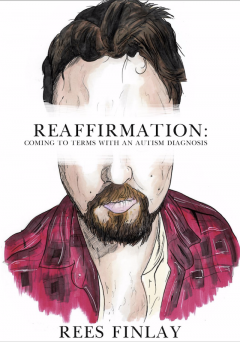 our new book chronicles your diagnosis of autism in adult life. What inspired you to turn such a complex and emotional event into a comic book?
our new book chronicles your diagnosis of autism in adult life. What inspired you to turn such a complex and emotional event into a comic book?
Rees Finlay: Processing my feelings through comics is becoming a running theme for me now, having done an autobio comic about the moral villainy of working for a payday loan company a few years back, but one year ago I was diagnosed as autistic at the age of 25. Left feeling confused, alone and helpless I turned to my local bookstore. And upon seeing 80% of the autism book section dedicated to children and their parents. I was inspired to join that 20% and contribute my voice to the conversation.
You may cover this in the previous question, but you mention there seemed to be very little discussion about adult autism in comics or books, why do you think that is? And do you think autism in general is covered sufficiently in the media?
RF: I delve deep into media representation in an entire chapter called ‘The Sheldon Cooper conundrum’ in which I voice a big concern and anger about how many creators of overtly autistic characters go out of their way to say they’re not. Eventually my anger towards these ‘Schrodinger’s autism’ characters subsides as I begin to see the logic behind it. The thing about autism is that it’s such a broad term that manifests itself in people in infinite variables, meaning one persons offensive stereotype is another person’s LIFE. So throughout comic books and media, there is not a good representation nor bad representation, it’s always completely open to the reader/viewer.
The book mixes comic pages and prose, why did you choose to go down that avenue for the format of the book?
RF: It started as just a comic book. A collection of short skits and adventures that eventually tie together at the end to show the bigger picture of my journey. But as we know, autism is so broad and complicated, it began to necessitate articles and deeper explorations to clarify and expand on my points. From there it grew into a book where the emotional core is held mostly in the comic pages, with the research and learning part of my journey being expressed through articles, anecdotes and rants within the prose sections.
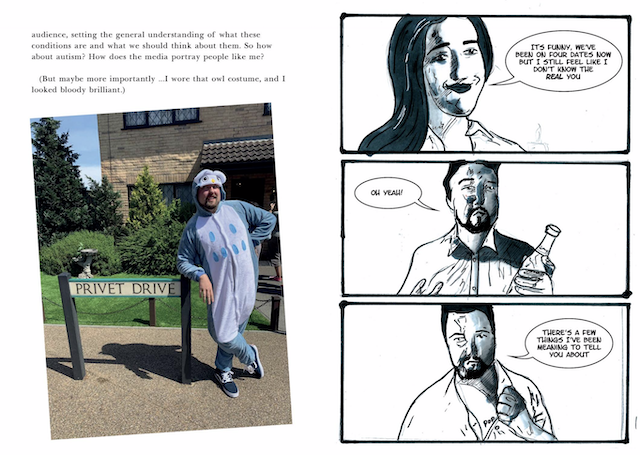
Why do you think comics lend themselves so well to discussing issue of mental health? Is it the ability to use imagery to explain complex emotional subjects, or is the nature of comic readers and creators that mean it is a more sympathetic medium with a welcoming audience?
RF: I think on a surface level it’s easier to resonate emotionally to artwork, so even if the comics are just stick figures, the drawing of a sad face immediately makes the reader understand the emotional resonance. But then also there’s the factor that the books are often autobiographical or their foundations are built upon real-life experiences, and the readers find themselves caring for that character a lot more than your Bruce’s (Banner, Wayne…..Forsyth?) so the stakes are higher, you’re rooting a lot more for them and you want to see them conquer the demons. And hopefully I’ve captured that too.
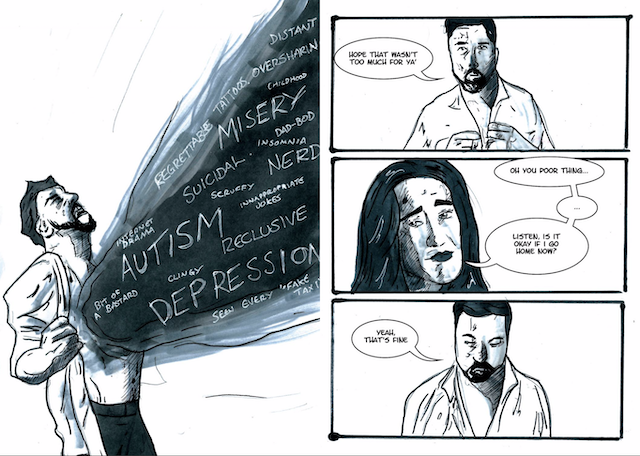
How does it feel opening yourself up to tell a story like this? Does it make the anxiety of selling it to the world more difficult, or does it make it easier knowing that you have been true to yourself and you can’t do much more than that?! And how has the book been received so far?
RF: It’s hard to wear your heart on your sleeve as any potential rejection can be taken personally quite easily. But the reality is that it’s an interesting blend (like when you mix Coke and Fanta at the self-serve) as you’re at your most vulnerable, but also feel invincible as it’s all out there and your weaknesses and flaws are now nothing but content. And luckily people within both the autism and comic communities online really took to that, and the kickstarter hit its target in its opening 3 days. Since then my heroes such as Neil Gaiman, Jon Ronson, and Mark Millar have been kind enough to help spread the word on twitter and we continue to sail through stretch goals to make the project even bigger as a result to all the amazing support from everyone.
How does working on such a personal book compare to working on something more mainstream like your High Priestess work? And which do you prefer?
RF: In a way it’s easier, as the story has already happened. So it’s less of a strain on the imagination compared to the worlds of fiction. But even through fiction I tend to build from an autobiographical core, so in one way ‘The High Priestess’ is about grief, parenting, sexuality, and atonement…..but it’s also about a super-powered woman fighting a mafia of demons at the end of the world. So I guess I prefer writing from a personal perspective.
I’d rather write with my heart rather than my head.
……christ that was corny.
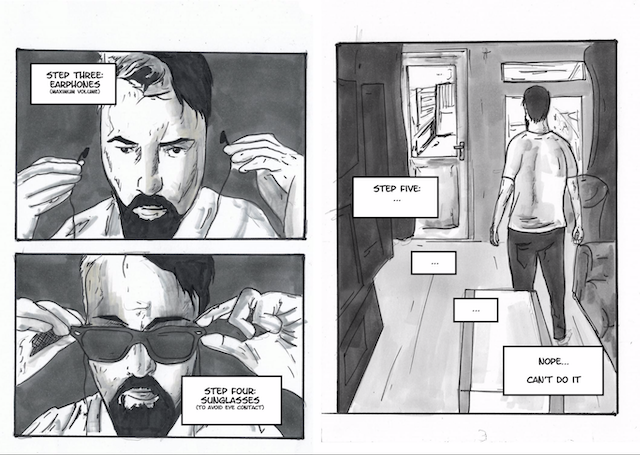
Has writing this book helped you to understand autism better and helped give your life a purpose and direction after the initial diagnosis?
RF: Absolutely. Not only did I make the book that I was desperately needing at the time (so now I can read it, others can too if they like) But through my reading and research I found a new home in the autism community, learning about neurodiversity and discovering the dark and scary history of society’s understanding of our condition. And as my knowledge and understanding grows, I continue to become more aware of myself and how my autism affects me, and allow me to grow in a positive direction.
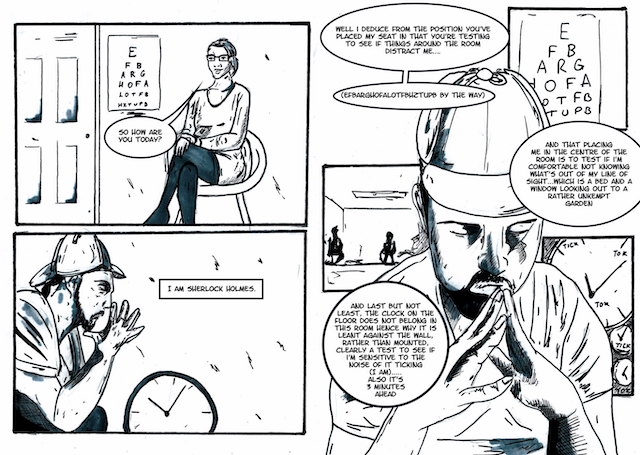
And finally will the book be available once the Kickstarter is finished? And will you be working on any other comics projects in the future or this is all encompassing for now?
RF: The distribution plan is very fluid at the moment while the kickstarter is live, as more money opens up doors for major distribution (my goal is to see this on a shelf in Waterstones one day………..I might just dump one there) But I intent to sell through indie friendly places like Comichaus, but also keen to do more public speaking with a blend of humour and advocacy for autism. So I’d like to take it on tour 2020 with book signings and media appearances, so watch this space.
As for future projects. There’s enough new topics and revelations that could fill a second book, but for now I want to focus solely on ‘reaffirmation’ and see if it can go the distance and break new ground in regards to the stigmas and issues around neurodiversity. But to afford that im stepping into new territory and drawing comics for actual comic writers, so I’m doing art duties on Daniel Faulkner’s ‘Grey’ following his successful kickstarter, it’s a very black -comedy about a cop who gets all the powers of…concrete. I’m doing the art super straight and serious and dark that clashes brilliantly with the dark humour of his script.
You can pledge your support for Reaffirmation on Kickstarter here. And for more on Rees’ work follow him on twitter @reesytime and on Facebook



September 25, 2025 @ 3:28 pm
Your article helped me a lot, is there any more related content? Thanks!
October 9, 2025 @ 2:11 am
Awesome! Its genuinely remarkable post, I have got much clear idea regarding from this post Watch persian bbc live — regional coverage for Iran and Afghanistan. reliable HD stream on any device. live updates, feature stories. reliable HD stream on any device.
November 12, 2025 @ 4:25 pm
Can you be more specific about the content of your article? After reading it, I still have some doubts. Hope you can help me.
December 19, 2025 @ 11:40 pm
Neben Tisch- und Automatenspielen können Sie erstklassige Live-Musik genießen.
Mit dem Auto nimmt man die A10 und folgt der Ausfahrt S102
Richtung Sloterdijk; Parkmöglichkeiten sind im Parkhaus direkt am Casino vorhanden. Gäste
können eine breite Palette klassischer Tischspiele genießen, darunter amerikanisches
Roulette, Blackjack, Baccarat und verschiedene Poker-Varianten. Die großzügigen Spielbereiche und
exklusiven Lounges schaffen ein einladendes Ambiente, das sowohl Entspannung als auch Spannung bietet.
Das Spielrepertoire umfasst zahlreiche Automaten, diverse Tischspiele sowie das
besondere Live-Bingo-Programm.
Laut der Website von Holland Casino vergüten “Spielautomaten” im
Durchschnitt 92 % des eingesetzten Geldes. Dabei handelt es sich um Extra Draw Keno, haben aber nur zwei
zusätzliche Kugeln für den zusätzlichen Einsatz gegeben. Nur im Raucherbereich im ersten Stock gibt es einige Kenospiele.
Dies ist ein besserer Wert im Vergleich zum herkömmlichen Baccarat, wodurch der Hausvorteil verringert wird.
Die Baccarat-Tische folgten einer selten gesehenen provisionsfreien Regel, nach der ein Bankier, der bei einer Gesamtanzahl
von 5 gewinnt, 1 bis 2 einbringt.
References:
https://online-spielhallen.de/dein-ultimativer-guide-zur-arena-casino-mobile-app/
December 26, 2025 @ 4:30 pm
Rocketplay is one of the best gaming sites , its fun , payout is good ,
and not boring !. So much better then all the other casinos I’ve played
at Just started playing rocketplay and I’m already enjoying it.
Thus, we encourage players to bear this in mind when deciding on which online casino to play at.
Join today to discover why so many players trust RocketPlay for their
online casino entertainment. The comprehensive mobile gaming experience ensures players never miss opportunities for entertainment and winning, regardless of their location or preferred device.
References:
https://blackcoin.co/casino-bonus-ohne-einzahlung/
December 27, 2025 @ 3:21 am
The company said it had received “several confidential, indicative and non-binding proposals” from Hong Kong investors Chow Tai
Fook Enterprises and Far East Consortium International Limited
to buy its 50 per cent stake in Queen’s Wharf. “All the flags are there it is a very substantial increase in credit risk exposure to a junket to which Star has historically not dealt with much.” The afternoon court proceedings were dominated by Dr Higgins explaining to the court
documents existed warning Star’s executives and directors of the risks of dealing with particular junket operators.
Mr Theodore, Star’s former chief financial officer, has agreed to settle with ASIC
and will have his penalty decided at a hearing by another judge.
The corporate regulator has claimed Star’s leadership failed to address money laundering risks and criminal associations at
its casinos between 2017 and 2019.
Let’s face it—people download Tubi because it just works.
Some people might not be willing to pay ten dollars every month for one thing they’ve seen before.
When the app is installed, you look at the content, hit
play, and you’re done. With so many services charged by subscriptions and secret costs,
it’s hard to believe it, but this one doesn’t do that.
Parents can restrict access to certain shows or movies to ensure a safe
viewing experience for children.
Queensland premier David Crisafulli said his interests were
“not in Star, not in the people who sit around the corporate boardrooms, my interests are in the working people who are there in that facility”.
About 2,000 people work at Star’s casino at Broadbeach on the Gold Coast.
The company employs 9,000 people across Queensland and New South Wales,
with 3,000 in Brisbane, about 2,000 on the Gold Coast and
3,500 in Sydney, as well as about 400 corporate staff.
Its shares plummeted by more than 15 per cent after the trading halt was
lifted on Friday morning.
References:
https://blackcoin.co/casino-bonuses-in-australia/
December 29, 2025 @ 5:40 am
paypal casino android
References:
kairoskonnectinc.com
December 29, 2025 @ 6:03 am
paypal casino
References:
jobspaceindia.com
February 6, 2026 @ 4:59 pm
international social work https://otvetnow.ru college in fort collins
February 8, 2026 @ 6:25 am
https://askoff.ru